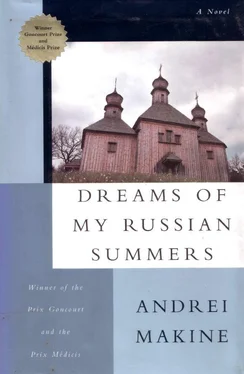But what affected me most was not the vehement tone of this diatribe. It was a disconcerting question that formulated itself in my head during the break, while the other pupils were assailing me with their mockery. ("Oh, look! He's wearing a crown, this tsar!" yelled one of them, pulling my hair.) The question was apparently quite simple: "Yes, I know he was a bloody tyrant; it says that in our history book. But if so, what is to be done about that brisk wind, smelling of the sea, that blew over the Seine? about the music of those verses that were carried away by that wind? about the scraping of the golden trowel on the granite? What is to be done about that day long ago? For I feel its atmosphere so strongly."
No, for me it was not a question of rehabilitating Nicholas II. I believed my history book and my teacher. But that far-off day; that wind, that sunny air? I was confused in these disordered reflections, part thoughts, part images. As I pushed away my laughing comrades, who were snatching at me and deafening me with their taunts, I suddenly felt terribly jealous of them: "How fortunate not to carry within oneself that day of great wind, that past so palpable and apparently so useless. Yes, to have only one view of life. Not to see as I see…"
This last thought seemed to me so strange that I stopped repelling my tormentors' attacks and turned toward the window, beyond which lay the snow-covered city. So I saw things differently! Was it an advantage? Or a handicap, a blemish? Perhaps this double vision could be explained by my two languages; thus, when I pronounced the Russian word "" a cruel tyrant rose up before me; while the word "tsar" in French was redolent of lights, of sounds, of wind, of glittering chandeliers, of the radiance of women's bare shoulders, of mingled perfumes, of the inimitable air of our Atlantis. I understood that this second view of things would have to be hidden, for it could only provoke mockery from others.
This secret meaning of words was subsequently revealed once more in a situation just as tragicomic as that of our history lesson.
I had joined an interminable queue that wound round outside the premises of a food shop, crossed the threshold, and then extended inside it. It was all, no doubt, for some foodstuff rare in winter – oranges, or perhaps simply apples, I no longer recall. I had already passed the most important psychological milestone of this wait, entering the door of the shop, outside which dozens of people were still squelching about in muddy snow. It was at that moment that my sister came to join me: as two people, we were entitled to a double quantity of the rationed goods.
We did not understand what suddenly provoked the anger of the crowd. The people standing behind us must have thought that my sister was trying to worm her way in without queuing – an unforgivable crime! Angry shouts erupted: the long snake contracted, threatening faces surrounded us. We both tried to explain that we were brother and sister. But the crowd never admits a mistake. Those who had not yet crossed the threshold – the shrillest – uttered indignant yells, without knowing exactly against whom. And as all mass actions exaggerate absurdly the impact of their efforts, it was me whom they now pushed out. The serpent quivered, the shoulders stiffened. One heave, and I found myself outside the queue, beside my sister, facing the serried row of hate-filled faces. I tried to return to my place, but the elbows formed a wall of shields. Distraught, with quivering lips, I met my sister's eyes. Unconsciously I sensed that we were particularly vulnerable, she and I. Two years older than me, she was not quite fifteen and did not have the presence of a young woman, while having lost the advantage of being a child, which might have touched this hard-boiled crowd. It was the same for me: at the age of twelve and a half I could not throw my weight about like young lads of fourteen or fifteen, strong in their irresponsible teenage aggression.
We slipped along the queue, hoping at least to be admitted some yards farther back from my lost place. But as we went past them the bodies closed ranks, and soon we found ourselves outside in the melted snow once more. Despite the cry of a saleswoman – "You there, beyond the door: you can give up waiting: there won't be enough for everyone!" – the people still came flocking.
We remained at the end of the queue, hypnotized by the anonymous power of the crowd. I was afraid to look up, or even to move. My hands, thrust into my pockets, were trembling. And when I suddenly heard my sister's voice, a few words tinged with a smiling melancholy, it was as if they came from another planet. "Do you remember? 'Roast bartavels and ortolans, garnished with truffles'?"
She laughed softly.
And as for me, as I looked at her pale face with the winter sky reflected in her eyes, I felt my lungs fill with an entirely new air – that of Cherbourg – with the smell of salt mist, of wet pebbles on the beach, and the echoing cries of seagulls over the endless ocean. For a moment I was struck blind. The queue was moving forward, slowly pushing me on toward the door. I allowed this to happen without letting go of the moment of illumination expanding within me.
Bartavels and ortolans… I smiled and gave my sister a discreet wink. It was not that we felt superior to the people squeezed together in the queue. We were like them, we may well have lived more modestly than many of them. We all belonged to the same class: that of people squelching about in trampled snow in the middle of a great industrial city outside the doors of a shop, hoping to fill their bags with two kilos of oranges.
And yet when I heard the magic words, learned from the banquet in Cherbourg, I felt different from them. Not because of my erudition (at the time I had no idea what these famous bartavels and ortolans looked like). It was simply that the moment held within me – with its misty lights and its marine smells – had put all that surrounded us into perspective: the city and its very Stalinist squareness, the anxious waiting, and the obtuse violence of the crowd. Instead of anger toward the people who had pushed me out I now felt a surprising compassion toward them: for by slightly screwing up their eyes, they could not gain access to that day with its fresh scents of seaweed, its cries of gulls, its veiled sun… I was seized by a terrible desire to tell everybody about it. But how to tell it? I would need to invent a language that did not yet exist. For the moment I only knew the first two words: bartavels and ortolans…
After the death of my great-grandfather Norbert, the white immensity of Siberia had slowly closed in on Albertine. True, she returned to Paris two or three times more, taking Charlotte with her. But the planet of the snows never relinquished its hold on the souls who had fallen under the spell of its uncharted spaces and its slumbering time.
Furthermore, the visits to Paris were marked by a bitterness that my grandmother's stories did not manage to conceal. Some family quarrel, the reasons for which we were not given to know. Or perhaps a very European coldness in the relationships between close family members, inconceivable to us Russians, with our exuberant collectivism. Or quite simply the understandable attitude of unpretentious people toward one of four sisters, the adventuress of the family who, far from returning with a fair dream of gold, each time brought back the anguish of a barbarous country and a broken life.
In any event, the fact that Albertine preferred to live at her brother's apartment and not in the family home in Neuilly did not go unnoticed, even by us.
Each time she returned to Russia, she felt more and more fated for Siberia – it was inevitable, a part of her own destiny. It was not only Norbert's grave that bound her to this land of ice, but also that somber Russian life experience, whose intoxicating poison she felt entering her veins.
Читать дальше












